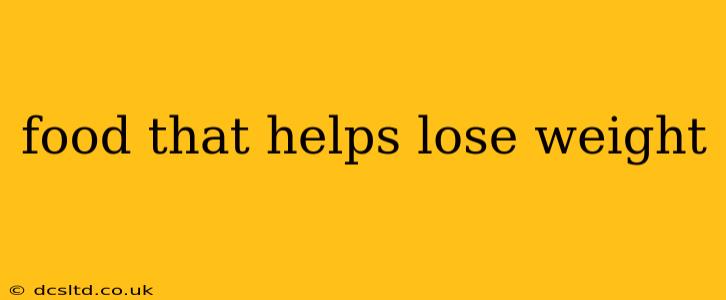Losing weight effectively involves a holistic approach encompassing regular exercise and a balanced diet. While no single food magically melts away fat, certain foods can significantly aid your weight-loss journey by boosting metabolism, promoting satiety, and providing essential nutrients without excessive calories. This guide explores those foods and answers common questions surrounding dietary choices for weight management.
What are the best foods to eat for weight loss?
The best foods for weight loss are generally those that are nutrient-dense, meaning they pack a lot of vitamins, minerals, and fiber into relatively few calories. These foods help you feel full longer, preventing overeating, and provide the energy you need to stay active. Examples include:
- Leafy Greens: Spinach, kale, lettuce – incredibly low in calories and high in fiber, making you feel full on minimal calories.
- Cruciferous Vegetables: Broccoli, cauliflower, Brussels sprouts – rich in fiber and nutrients, supporting a healthy metabolism.
- Lean Protein: Chicken breast, fish (salmon, tuna), beans, lentils – crucial for building and maintaining muscle mass, which boosts metabolism. Protein also keeps you feeling fuller for longer.
- Fruits (Berries, Apples, etc.): Naturally sweet and packed with fiber and antioxidants, providing essential nutrients without excessive sugar. Berries are particularly low in calories.
- Whole Grains (Quinoa, Oats, Brown Rice): Higher in fiber than refined grains, promoting satiety and digestive health. Choose whole grain versions over refined options.
What foods should I avoid when trying to lose weight?
Conversely, certain foods can hinder your weight-loss efforts. These are often high in calories, unhealthy fats, added sugars, and refined carbohydrates, offering minimal nutritional value. Foods to limit or avoid include:
- Processed Foods: Often high in sodium, unhealthy fats, and added sugars. Read food labels carefully!
- Sugary Drinks (Soda, Juice): Empty calories that contribute to weight gain and provide little nutritional benefit.
- Fast Food: Typically high in calories, unhealthy fats, and sodium.
- Excessive Alcohol: High in calories and can lead to poor food choices.
- Refined Grains (White Bread, White Rice): Lack the fiber of whole grains, leading to less satiety and potential overeating.
What are some healthy snacks for weight loss?
Snacking strategically can help prevent overeating during meals. Choose healthy, low-calorie snacks that keep you feeling full and energized:
- A handful of almonds or other nuts (in moderation): Healthy fats and protein provide sustained energy.
- Greek yogurt with berries: High in protein and antioxidants.
- Hard-boiled eggs: Excellent source of protein.
- Apple slices with peanut butter (in moderation): Fiber and healthy fats.
- Air-popped popcorn: A whole-grain snack low in calories.
Does eating more frequently help with weight loss?
The frequency of eating is a matter of personal preference and depends on individual needs and metabolic responses. Some people find that eating smaller, more frequent meals helps them manage hunger and avoid overeating. Others prefer fewer, larger meals. The key is to focus on the overall calorie intake and the nutritional quality of the food consumed, regardless of the number of meals.
Can I lose weight by just changing my diet?
While diet plays a crucial role in weight loss, it's generally more effective when combined with regular exercise. Exercise helps build muscle mass, boosting metabolism and burning more calories. A combined approach of healthy eating and regular physical activity yields the most sustainable and effective results.
What is the best diet for weight loss?
There's no single "best" diet for everyone. The most effective diet is one that you can maintain sustainably over the long term. Focus on a balanced diet rich in fruits, vegetables, lean protein, and whole grains while limiting processed foods, sugary drinks, and unhealthy fats. Consider consulting a registered dietitian or nutritionist to create a personalized plan tailored to your individual needs and preferences.
Disclaimer: This information is for general knowledge and does not constitute medical advice. Consult a healthcare professional before making significant dietary changes, especially if you have underlying health conditions.
